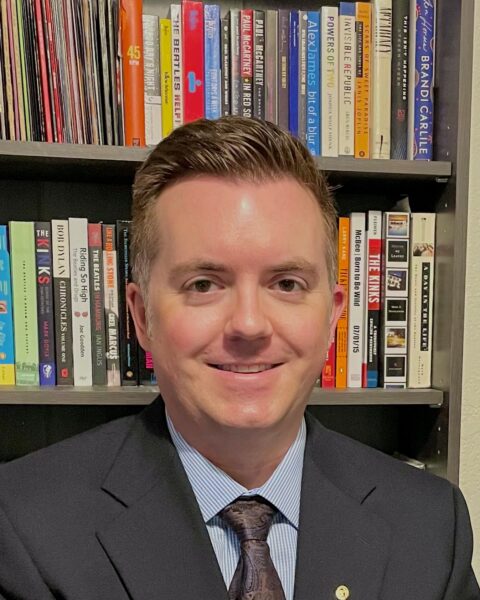Richard D. Driver is an associate professor of history at McLennan Community College. He lives in Hewitt, Texas, and has been a member since 2014.

Richard D. Driver
Twitter: @ppbkwriter
Alma maters: BA, Texas Tech University, 2005; MA, Texas Tech University, 2007; PhD, Texas Tech University, 2014
Fields of interest: 20th-century America, political, cultural, social, popular music, the Beatles, Paul McCartney
Describe your career path. What led you to where you are today?
I started teaching while completing my PhD and found that I loved engaging with students and enhancing their understanding and analysis of historical methods and developments. After I completed my PhD I enjoyed opportunities working with junior- and senior-level students on research projects and teaching degrees. Those opportunities tuned me into the important work taking place in our community colleges and in turn pushed me to seek out teaching positions. I spent three years at a community college in San Antonio, Texas, before I found my dream position teaching students in introductory history courses and continued opportunities directing research projects and supporting students seeking teaching degrees.
What do you like the most about where you live and work?
I have supportive and enthusiastic colleagues, friends, and administration, that push me to continually enhance and improve my teaching and service for our students, our community, and our profession. I also have the opportunity to continue working with my alma mater through a regional site in Waco, Texas, and connected to McLennan Community College, serving students transferring from our community college to the four-year university experience.
What projects are you currently working on?
I am currently working on a manuscript about Paul McCartney’s legacy as a solo musician in the history of popular music. At the 2020 Popular Culture Association conference I presented a side project on McCartney about the release and reception of his pandemic album, McCartney III. I hope to expand that paper into an article or chapter-length submission outside my book project.
Have your interests evolved since graduation? If so, how?
In teaching, my content has been informed and enhanced through the discussion questions and research topics my students have explored in class and through projects. I have had students that pushed for important connections for developments at specific points and through research into major events, such as the World’s Columbia Exposition in Chicago in 1893 and the ferris wheel at the center of the midway at that fair, or the environmental history of the Galveston hurricane of 1900. Outside the classroom, the important historical developments of the 2010s pushed me to expand the endpoint for my content into the modern era, bringing new voices and topics for students to engage and explore. Only a year after I graduated and just before my daughter was born, the Obergefell v. Hodges Supreme Court decision informed my interest in civil rights and expanded inclusion for the classroom.
What’s the most fascinating thing you’ve ever found at the archives or while doing research?
Early in my dissertation research I listened to multiple oral interviews with western swing fiddlers, including Cliff Bruner from southeast Texas. Their stories and careers as musicians and sharecroppers in the 1920s and 1930s were fascinating and revealing about race relations, economic opportunities, and music as a career option for out-of-work Americans in that era.
Is there an article, book, movie, blog etc. that you could recommend to fellow AHA members?
Throughout the COVID-19 pandemic I listened to many podcasts and increased my reading of blogs and newsletters by fellow Beatles scholars and historians. I recommend Heather Cox Richardson’s daily Substack Letters from an American for her deep historical insight and connections to current events and developments.
What do you value most about the history discipline?
Its capacity to increase analytical and critical thinking skills for teachers and students. Showcasing historical methods and how history is researched offers students confidence in their work and knowledge. I have always enjoyed offering that resource and discussing historical events with students from multiple perspectives. The discipline enriches our backgrounds and how we approach our daily experiences.
Why is membership in the AHA important to you?
Membership in the AHA is important to me through the resources and information shared about history as a profession. The teaching resources through the Tuning project and regional conferences on introductory history courses have been excellent places for building connections and sharing teaching methods.
AHA members are involved in all fields of history, with wide-ranging specializations, interests, and areas of employment. To recognize our talented and eclectic membership, Perspectives Daily features a regular AHA Member Spotlight series.
This work is licensed under a Creative Commons Attribution-NonCommercial-NoDerivatives 4.0 International License. Attribution must provide author name, article title, Perspectives on History, date of publication, and a link to this page. This license applies only to the article, not to text or images used here by permission.
